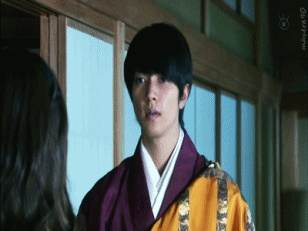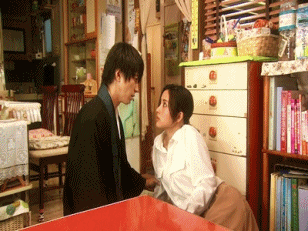|
|
楼主 |
发表于 2014-11-25 01:03
|
显示全部楼层
本帖最后由 corona0911 于 2014-11-25 01:05 编辑
http://nextprojection.com/2014/11/21/afi-film-fest-haemoo-review/
AFI FILM FEST: Haemoo Review
BY ROWENA SANTOS AQUINO ON NOVEMBER 21, 2014
AFI FILM FEST 2014, FILM FESTIVAL, REVIEWS
Haemoo (2014)
Cast: Yun-seok Kim, Yu-Chun Park
Directors: Sung-bo Shim
Country: South Korea
Genre: Drama
Editor’s Notes: The following review is part of our coverage of the AFI FILM FEST 2014. For more information on the festival visit afi.com/afifest and follow AFI on Twitter at @AmericanFilm.
The debut feature of Shim Sung-bo is a leviathan of a film, given its production values, socio-historical and emotional scope, and subject. At one level, it tells of a rickety, small-time fishing vessel whose captain agrees to smuggle twenty-five Korean Chinese into South Korea in order to save the ship from being sold. Though new to the world of human smuggling, the captain and his five-man crew nevertheless do their best to ensure a trouble-free, safe, and clandestine arrival. This premise has the majority of the film—with the exception of the opening sequences—take place entirely on the boat, in calm and rough waters. At another level, the film is a taut exercise in tonal shifts and genre-bending, as anything but trouble-free or safe happens on the ship, which then provokes the basest of instincts amongst the people on board. With Shim reuniting with his Memories of Murder (2003) co-screenwriter Bong Joon-ho (whose most recent film, Snowpiercer, features a singular setting and an iron leviathan), who also served as an executive producer, Haemoo is a dark and relentless study of the human psyche.
The debut feature of Shim Sung-bo is a leviathan of a film, given its production values, socio-historical and emotional scope, and subject.
Haemoo is based on a 2007 play of the same title by Kim Min-jung, and is in turn based on an actual event that took place in 1998. The story betrays the time in which it takes place through dialogue, with references to the ‘IMF crisis’ (the country’s specific experiences of the Asian financial crisis that began in 1997, which involved a bailout from the International Monetary Fund). In turn, major plot points serve as an analogy to the said crisis, principally Captain Kang’s situation at the film’s beginning of trying to hold on to the ship when the catch has been minimal and so forced to look for other means to secure some money. But what makes Haemoo all the more gripping and powerful is that it does not have any allegorical pretense. Sure, the IMF references are there, but the film is not meant to be read exclusively as a coded representation of the crisis. Nor can the film be reduced to a didactic treatise on the horrors of human smuggling. It addresses these traumatic events and complex issues, to be sure, but it does so at the level of the psychological.
cdn.indiewireThe film first establishes the affable, homosocial space of the ship, as it begins with the crew at sea. Each man’s character reveals itself in relation to the others in terms of their tasks, verbal exchanges, and actions, which continues when they return to land. When they set sail again, this time to smuggle immigrants, the mood ever so slightly darkens among the five men because one, Kang had not told his crew in advance of this new enterprise, and two, they thus find themselves in something with which none of them is familiar. Each plot point becomes, in retrospect, a Dantean circle of Hell traversed: from picking up the immigrants in the middle of the sea, to the tragedy that befalls them on the way to South Korea, to the crew’s senseless reaction to the tragedy, and to the crew members’ transformation that would lead to further tragedy. Through its concentrated space and setting—not to mention stunning cinematography by Hong Kyeong-pyo, which also greatly narrates the story—Haemoo takes a clinical, unblinking look at the horrific qualities of self-preservation, which, by implication, is not too far from madness.
On the whole, piercing in its unraveling of character, assured in its direction and pacing, it is a thrilling Korean blockbuster in the best sense of the terms.
To pull off the raw emotions inherent in the premise is a multigenerational cast of male actors and one actress. Kim Yun-seok as the stubborn, aloof, and brooding Captain Kang, his face a veritable landscape of torn emotions; veteran actor Moon Seung-geun as the moral compass that is Wan-ho; Yoo Seung-mok as the bawdy, happy-go-lucky Kyung-koo; Kim Sang-ho as the straightforward-thinking Ho-young. They are accompanied by a trio of younger actors Lee Hee-joon as the lusty Chang-wook; JYJ member Park Yoo-chun in his debut film role of the youngest and most naive of the crew Dong-sik; and Han Ye-ri as the Korean Chinese woman Hong-mae with whom Dong-sik gets involved. The exclusively homosocial space that is the fishing vessel is broken with the arrival of women on board when the crew picks up the Korean Chinese. An imbalance entails, articulated most succinctly by Kang when he objects to bringing women to the ship because it is bad luck.
On this note, as the film reaches its climax, it becomes a simplistic matter of rescue and romance, in direct contrast to the complexities of what had come before. The first three quarters of the film, however, are superb in its dramatic build-up of suspense, through character, mood, and silence as much as dialogue; these portions of the film strike a nuanced balance between the socio-historical, the psychological, and genre. On the whole, piercing in its unraveling of character, assured in its direction and pacing, it is a thrilling Korean blockbuster in the best sense of the terms.
8.9
GREAT
With Shim reuniting with his Memories of Murder (2003) co-screenwriter Bong Joon-ho, who also served as an executive producer, Haemoo is a dark and relentless study of the human psyche. |
|























